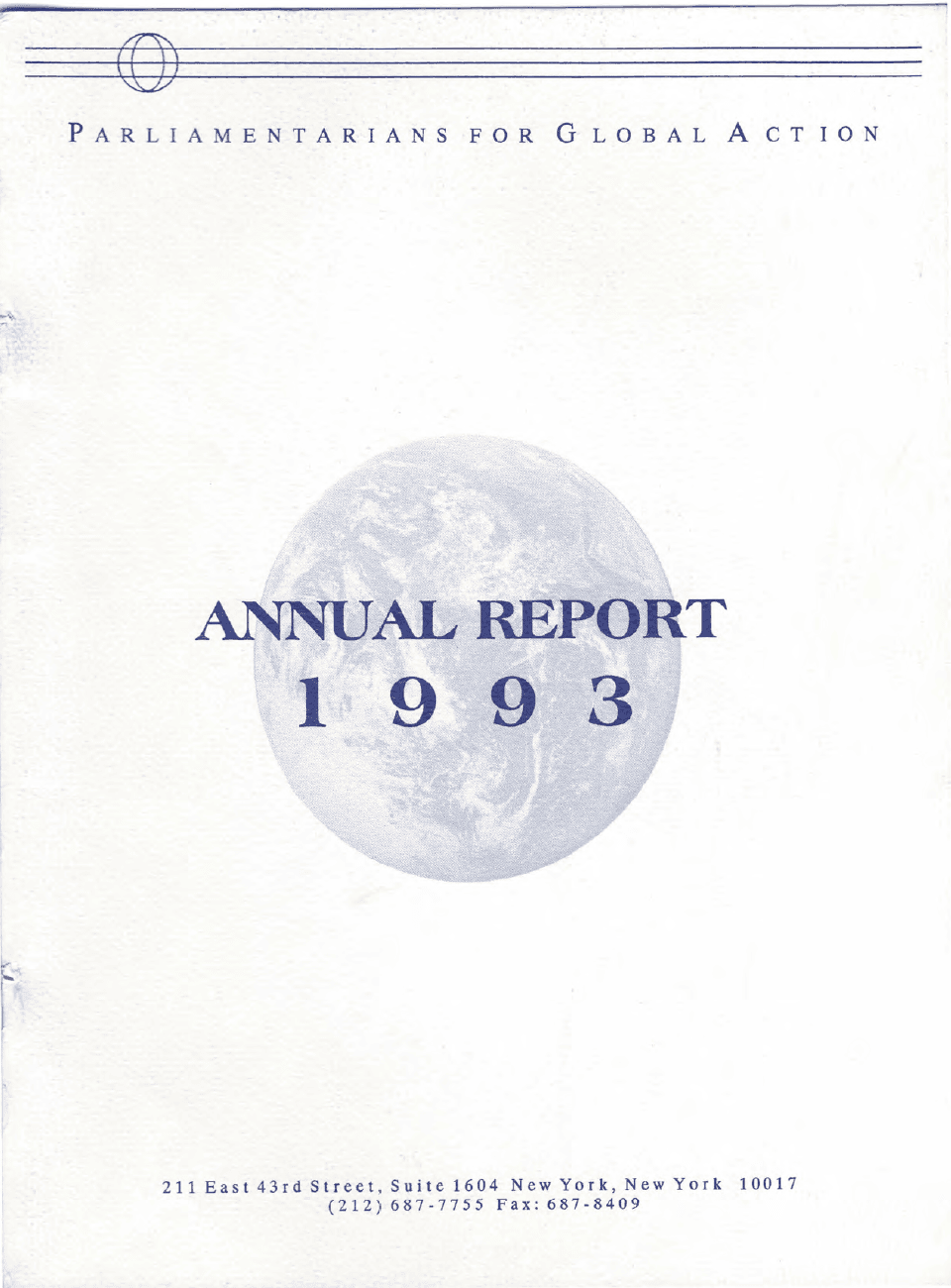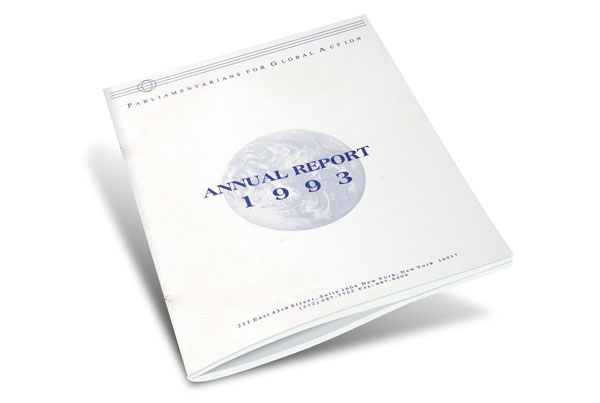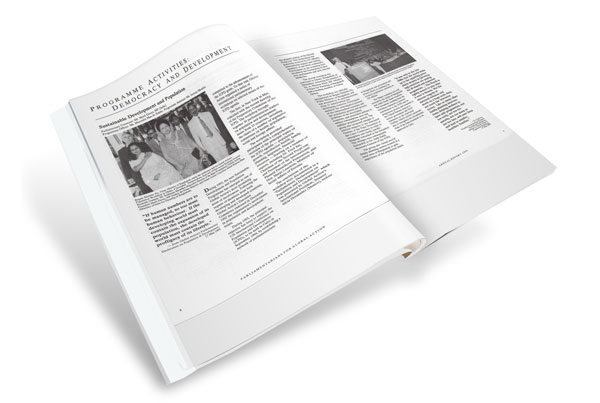Publication

Rapport annuel de PGA 1993
(disponible en anglais)
Description
1993: Global Governance for a Planet Under Stress
Two events of personal significance to me symbolise the year of 1993. One morning in May, an eight-year old girl sat beside me in an august hall of the United Nations as I delivered a submission, developed at PGA's own Workshop, to the Preparatory Committee for the UN Population and Development Conference. "The Earth," I said to the gathering of diplomats, "cannot sustain the increase in population numbers and the continued excessive consumption pattern of some societies that we are witnessing today. Things have to change ... On behalf of the 19 million citizens which this Workshop of our members represents, we convey to you a political mandate for change. In the name of parliamentarian colleagues and my daughter Maria del Mar, I present this Declaration to you." Maria looked around her at the distinguished UN gathering, symbolising the vulnerability of children the world over before the mounting problems of the planet, dependent on our ability to resolve them in time.
That is what motivates and drives me and my colleagues in Parliamentarians for Global Action. I have not met all of the 900 members in the organisation, but I know many of them. And I know that, in each case, it is their own children and mine whom they have in mind when they join and work for our goals. Many of course are less fortunate than Maria del Mar. Those of my African colleagues share a doctor with 24,000 others, compared with 470 in the North. Some 34,000 die each day around the world through disease and malnutrition.
The North-South dichotomy is the obscenity of our generation: while 23% of the world's people enjoy 85% of its income, the 1 billion "absolute poor" survive on less than a day. But even the privileged children in the North face global problems that they cannot escape, anywhere on the planet. They, equally, are dependent on our foresight, our commitment and our political skills to help them.
In the Introduction to our 1992 Annual Report, I emphasised the process of transition which the world was undergoing as it emerged from the Cold War into a new era of co-operation. The past year, 1993, has been a continuation of those trends.
Further hopeful developments occurred around the world that lay to rest the vestiges of the Cold War. The remarkable breakthrough for Middle East peace is one of the political milestones of our century. The successful elections and associated progress toward national unity, democracy and stability in Cambodia represent another major achievement for the United Nations. And the agreement for the transition to majority rule in South Africa and the plans for non-racial elections there vindicate the struggle against apartheid by brave men and women inside and outside that country. All three developments bring the world a step closer to political maturity.
Such positive political developments, however, were accompanied by individual acts of violence. Tension and killing continues in the Middle East and South Africa, while conflict rages in Angola, Azerbaijan, Bosnia and Georgia. Political maturity is an essential quality for a world threatened with problems of a new magnitude. The hallmark of our organisation is "the planetary interest" - perceiving the world as a single whole, and responding, politically, with global solutions that reflect an enlightened national interest for each of our countries, not one that is narrowly conceived and competitively pursued. We must not only think of our world as one, we must base political decisions and action on it - along with our role as parliamentarians who are committed to each country's essential values.
The philosophy of the planetary interest is what underpinned the second event that marked 1993 for me. For during the year, I led a PGA delegation to meet with the UN Secretary-General, H.E. Boutros Boutros-Ghali, and passed over a submission to him that set out our organisation's vision of a future world. Entitled "Towards a Global Security System for the 21st Century", the document is a manifesto of the principles and policies which PGA has developed and pursued in recent years for the betterment of the planet. It contains the "seven principles of global politics" which I outlined in the 1992 Annual Report, namely democracy, the rule of law, collective security, the regulation of armaments, sustainable development, economic equity and human rights. Each of these principles contains a set of prescriptive measures which PGA is pursuing.
During 1993 a new concept emerged that offers potential for progress in strengthening our capacity to deal with the problems of our time: "global governance". This reflects no ambitious faith in a world government for which our world is not ready. Rather it is a judgement that the world is ready for, and in need of, a systemic development of the United Nations. Also a devolution of authority below the nation-state, so that issues that are either too big or too small for the nation to handle can be dealt with more effectively and democratically in the future. During the year several conferences focused on the notion of global governance, and the concept is clearly attracting interest. Above all, the new Independent Commission on Global Governance, led by co-chairmen Ingvar Carlsson and Sir Shridath Ramphal, is preparing a report on the subject. PGA has been co-operating with the Commission during 1993 and awaits its report with interest and anticipation.
It is new ideas such as this that the world needs. Now is the time for innovative ideas to be conceived and nourished. Not all will gain acceptance at the bar of global public opinion. But some will, and some must. The 50th anniversary of the United Nations is only a year away. It must not be simply a celebration of our limited achievements over the half-century; it must be a substantive occasion, one for reflection on the past, and of imagination and resolve for the future. PGA places profound importance on the opportunity which the end of the Cold War provides for building better norms and institutions for the 21st century. The opportunity will not last forever. It must be seized now. Maria del Mar and her billion or so fellow humans under 10, demand, and deserve, no less.
Senator Silvia Hernández
International President
PDF(s)
Additional Details
- Type de publication: Annual Report
- Date de publication: 01 February, 1994
- Auteur.e.s: Parliamentarians for Global Action



